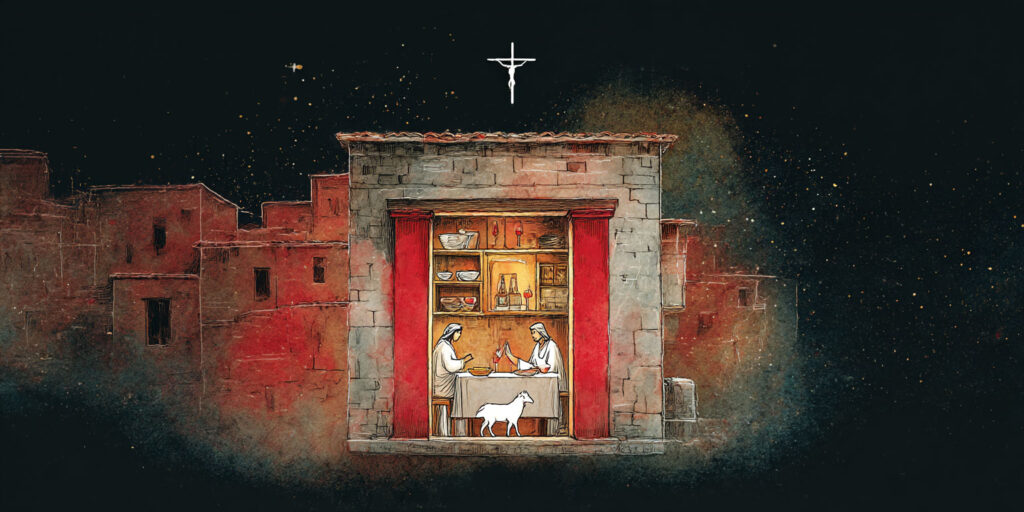
Peace
The gospel claims something bold: God offers real peace. Peace with Him, peace inside yourself, and peace with other people. But that peace isn’t automatic…

And the Lord said to Moses and Aaron, “This is the statute of the Passover: no foreigner shall eat of it, but every slave that is bought for money may eat of it after you have circumcised him. No foreigner or hired worker may eat of it. It shall be eaten in one house; you shall not take any of the flesh outside the house, and you shall not break any of its bones. All the congregation of Israel shall keep it. If a stranger shall sojourn with you and would keep the Passover to the Lord, let all his males be circumcised. Then he may come near and keep it; he shall be as a native of the land. But no uncircumcised person shall eat of it. There shall be one law for the native and for the stranger who sojourns among you.”
All the people of Israel did just as the Lord commanded Moses and Aaron. And on that very day the Lord brought the people of Israel out of the land of Egypt by their hosts.Exodus 12:43-51
In Exodus 12:43–51, God gives Moses and Aaron very specific instructions about the Passover meal. It wasn’t simply a traditional dinner or a cultural ritual. It was a sacred covenant meal, reserved for those who were in a relationship with God—those who were part of the covenant through circumcision. Outsiders could not participate unless they fully entered into the covenant community. At first glance, these regulations seem exclusive, even unwelcoming. But when we dig deeper, we realize that God was not being harsh. He was protecting people from assuming they were spiritually safe when they were not.
A story illustrates this point well: A young boy was supposed to receive a vaccination to protect him from a dangerous illness. He lined up at the school with all the other children and gave every impression that he received the shot. He even joked with others about the experience and attended follow-up visits. But in reality, he had never taken the medicine. Later, he became sick, and only then did the truth come out. Fortunately, treatment was still available, and he recovered. But the warning was clear: going through the motions isn’t the same as receiving the cure.
This applies powerfully to our relationship with God. We can go through the outward motions of religion—attending services, participating in communion, celebrating holidays like Christmas and Easter—and still miss the essential: a personal, covenant relationship with God. The Passover was not for spectators. It was for those who had entered into a relationship with God through the means He had provided.
God used the Passover meal to teach and remind His people of His powerful act of deliverance. Each year, they were to recount how God freed them from slavery in Egypt, protected them through the blood of the lamb, and led them toward freedom. The lamb’s blood, painted on the doorposts and lintel, was a foreshadowing of Jesus’ sacrifice. His blood, shed from His head, hands, and feet, would be the ultimate fulfillment of the Passover, offering permanent forgiveness and freedom.
Every detail of the Passover meal pointed to something greater. The bitter herbs reminded them of the harshness of slavery. The lamb reminded them of the need for a sacrifice. The unleavened bread symbolized urgency and readiness to follow God without delay. And in every bite and every symbol, they were to remember not just what God had done, but what He promised to do.
Jesus chose the Passover as the setting for the Last Supper for a reason. When we partake in communion, we are not merely remembering a meal—we are remembering a sacrifice. We are declaring our place in a covenant, not just observing a tradition. Communion, like the Passover, is not for those outside the covenant. Not because we want to exclude, but because we dare not let anyone confuse participation with salvation.
That’s why Paul told the Corinthian church to examine themselves before taking the Lord’s Supper. Not to discourage, but to encourage true reflection. If you’re a Christian, the table is for you. Not because you’re perfect, but because you know you need grace. You recognize your sin, you’ve confessed it, and you trust in the finished work of Christ.
But if you haven’t entered into that relationship yet—if your faith is just going through the motions—you’re missing the medicine. And like the boy who didn’t get the vaccine, symptoms will show up eventually. The outward signs might look good, but the inward transformation is what matters.
Becoming a Christian isn’t about saying the right words or performing the right rituals. It’s about acknowledging our sin, our inability to save ourselves, and trusting in Jesus’ death and resurrection for our salvation. It requires humility—an admission that we need a Savior.
God’s invitation has always been consistent: enter into covenant with Him. In the Old Testament, it was through circumcision and faith. Today, it is through faith in Christ, repentance, and receiving His gift of grace. It’s not about earning favor; it’s about receiving mercy.
C.S. Lewis once said that too many of us are content with playing in the mud when God offers us a holiday at the sea. We settle for too little when God offers us everything. That’s what covenant life with God is—everything.
God designed the Passover to be more than a history lesson. It was a heart-check. It was a reminder that real faith must be personal. The exclusion from the meal wasn’t cruelty; it was clarity. Don’t mistake ritual for redemption. Don’t mistake form for faith.
So as we prepare to receive communion, let’s not approach the table lightly. Let us examine our hearts. Let us confess our sins. And let us receive again the grace we so desperately need.
Because God isn’t interested in hollow rituals. He wants real relationship. He doesn’t want us just painting the door with blood—He wants our hearts covered in it. He wants us not just to remember the story—He wants us to live it.
Take the medicine. Receive the grace. And walk forward in the new life only Jesus can give.

The gospel claims something bold: God offers real peace. Peace with Him, peace inside yourself, and peace with other people. But that peace isn’t automatic…

Advent starts by asking us to slow down and look past the distractions. Every culture wraps Christmas in its own extras—traditions, shopping, decorations, sentimental ideas.

After Paul left Galatia, other teachers came. They questioned Paul’s authority and offered the Galatians a far more “comfortable” message…

Jesus leaves the synagogue in Capernaum and steps into a home. Simon Peter’s mother-in-law lies with a high fever.

Paul writes to a church he has never visited, yet he sounds like a pastor who knows them well: he encourages, challenges, and points every road back to Christ…